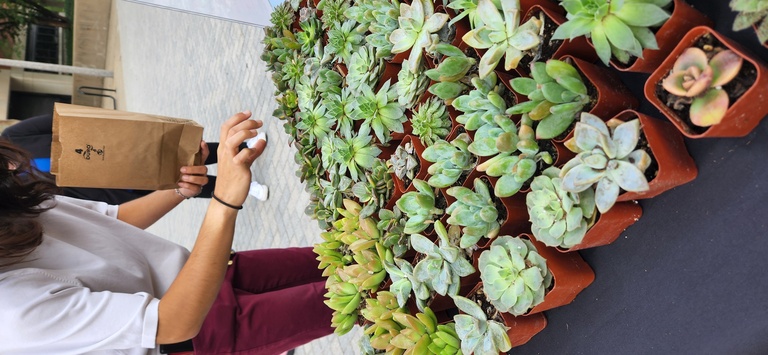About Your Plant
Students who attend the Office of Sustainability and the Environment's Open House during On Iowa can receive a free succulent plant as a welcome gift (while supplies last). These low-maintenance plants are a great way to brighten your new living space and connect with nature from day one.
Succulents are a diverse group of plants known for their thick, fleshy leaves or stems that store water. They come in a wide variety of shapes, colors, and textures. Their resilience and minimal care needs make them perfect companions for dorm rooms and apartments.
How to Care for Your Plant
- Soil: Use well-draining soil designed for succulents. A mix with sand, perlite, or pumice helps prevent root rot.
- Watering: Only water when the soil is completely dry. Overwatering is the most common mistake. In warmer months, this may be every 1–2 weeks; in cooler months, every 3–4 weeks.
- Light: Succulents love bright, indirect sunlight. Aim for 6–8 hours per day. Avoid placing them in harsh direct sun, which can cause leaf burn.
- Temperature & Humidity: Ideal temperatures range from 60°F to 80°F. Succulents prefer low humidity.
- Feeding: During spring and summer, feed monthly with a diluted, balanced fertilizer made for succulents.
Benefits of Plants
Did you know the act of caring for plants can come with a number of health benefits? Here are just a few compiled by University Libraries with support from UI Student Wellness.
Reduce Stress and Anxiety
Source: Lee, et al. (2015). “Interaction with indoor plants may reduce psychological and physiological stress by suppressing autonomic nervous system activity in young adults.” Journal of Physiological Anthropology.
Improve Concentration and Memory
Source: “Health and well-being benefits of plants” – Texas A&M Agrilife Extension
Lessen Depression
Source: Gonzalez, et al. (2009). “Therapeutic horticulture in clinical depression: a prospective study”. Research & Theory for Nursing Practice
Promote Healing and Recovery
Source: “Health and well-being benefits of plants” – Texas A&M Agrilife Extension
Find Nature Inside and Out

Put Nature to Work



